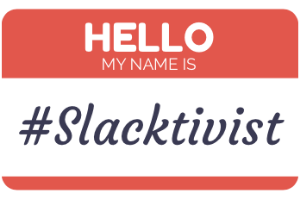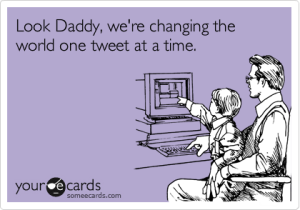 Photo Credit
Photo Credit
Slacktivism is when people support good causes or events by doing something, usually online, that requires very little time or thought. Slacktivism activities include signing an online petition, sharing a news article, or wearing a T-shirt to raise awareness. So does slacktivism actually do anything? Some think so and others disagree.
The ASL Ice Bucket Challenge was a huge success. It generated $100 million in donations, informed a very large number of people, and brought awareness about this frightening disease. Black Lives Matter and the #FightFor15 campaign are evidence that slacktivism works. These protests were organized and awareness was gained through social media. Did everyone who ‘shared’ or ‘liked’ these campaigns take to the streets to protest? No, but they were instrumental in spreading the word. Social media is a powerful thing and one of its strengths is reaching a wide audience in a very short time frame.
A recent study revealed that online participation in worthy causes is vital in making a protest into a social movement and in extending the duration that the cause is in the limelight. Even a slacktivist that retweeted or shared just  once, made a difference. “The network effect created by this engagement made the actions of just a few active protesters visible to millions of people, all over the world.” Live streaming apps like Meerkat and Periscope are able to make someone sitting on their couch feel like they are part of the action. It allows those Photo Credit: someecards.com
once, made a difference. “The network effect created by this engagement made the actions of just a few active protesters visible to millions of people, all over the world.” Live streaming apps like Meerkat and Periscope are able to make someone sitting on their couch feel like they are part of the action. It allows those Photo Credit: someecards.com
that are in the protest to feel supported
and keep fighting when they receive comments and positive emojis from onlookers. This technology has the ability to move viewers from just watching to doing. Another study found that people who are involved in online movements are more likely to participate in real life, on the ground activism.
There are those that feel that slacktivism has little or no positive effects. A slacktivist may feel satisfied that they have contributed, but has that ‘drop in the bucket’ contribution done anything other that boost their ego? A study out of UBC found that people who “liked” a cause on Facebook were not as likely to give money to that cause. Scott Gilmore argues that social media enables slacktivists. When people ‘share’, ‘like’ or retweet they receive the same feel good endorphins one gets when they do an altruistic deed. “Unfortunately, modern times confuse the brain and it mistakes actually feeding the starving with re-tweeting #FeedTheStarving.”

Photo Credit
What do you think? Does slacktivism have a place in our society today? Does it really accomplish anything or does it just give people the good feeling of supporting a cause without actually doing anything? Or instead of debating whether slacktivism is good or bad, Kayla asks, is the question we should be focusing on, what do we need to solve the problem?
I think there is a need for Slacktavism in our society. It helps raise awareness of the issues our world is facing today. I also feel like people need to consider the online tools that are available to be online activist as well. For example: there are many sites that people can give money to help people like https://www.facebook.com/groups/322858994523816/
or https://www.gofundme.com/ I think we have to keep in mind activism can also be online.
LikeLike
I mentioned this is my post this week, but I think that it’s okay to be a Slacktivist. It definitely does the raise awareness however we do have to question whether or not raising awareness can be described as helping. I think that raising awareness is a good thing because there are issues that some people are unaware of. Maybe there is someone in the crowd that is currently unaware that would support the cause and do something beyond just clicking share or like. Without raising awareness those people would never be reached. We do need to go beyond the screen and discuss the issues in person with friends, families and colleagues as well though. I don’t think that you should feel like you have done your part for simply clicking a mouse. But that’s just me.
LikeLiked by 1 person
I completely agree that slacktivism does have a place in our society and it does play a critical role in raising awareness.
LikeLike